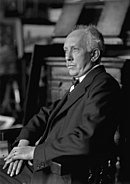Die Tageszeiten
| Die Tageszeiten | |
|---|---|
| Choral composition by Richard Strauss | |

Strauss, photo by Schmutzer 1922
|
|
| English | Times of the Day |
| Catalogue | Op. 76, TrV 256 |
| Text | Poems by Joseph Eichendorff |
| Language | German |
| Composed | 19 December 1927, Vienna. |
| Dedication | To The Wiener Schubertbund and their conductor Viktor Keldorfer |
| Scoring | Male voice choir and orchestra. |
Die Tageszeiten (Times of the Day) is a choral composition written for male voice choir and orchestra by Richard Strauss (1864–1949), TrV 256, Op. 76 (published 1928). It consists of four movements: "The Morning", "Afternoon Peace", "The Evening" and "The Night". The lyrics are based on four poems of the same names by Joseph Eichendorff (1788–1857) from his collection Wanderlieder (Wanderers' songs). The work was premiered on 21 July 1928 with the Wiener Schubertbund (Vienna Schubert Society) and the Vienna Philharmonic as part of the Schubert centenary.
On 1 May 1924, the male voice choir of the Wiener Schubertbund (Vienna Schubert Society) serenaded Strauss in honor of his sixtieth birthday outside his house on Mozart-Platz. The choirmaster, Viktor Keldorfer, took the opportunity to ask if Strauss might write a piece for the choir and suggested the poetry of Joseph Eichendorff as a possible text.
Eichendorff was a very popular Romantic poet whose songs had been set many times by composers, such as Hugo Wolf. Indeed, Strauss had used Eichendorff in earlier choral works and was to turn to Eichendorff twenty years later for one of his Four Last Songs, Im Abendrot, also about a time of the day. His response to Keldorfer's suggestion was to comment about the poet: "Good! Very good! He is a full blooded romanticist who is close to me".
The idea developed slowly in Strauss' mind, and Keldorfer heard nothing until in 1927 he received an invitation to visit Strauss at his home in Garmisch where Strauss showed him three of a four movement song cycle based on poems from Eichendorff's Wanderlieder ("Der Abend" was completed later that year). In this initial version, Strauss had composed an orchestral opening, a depiction of dawn leading to the first line of the poem "Fliegt der erste Morgenstrahl". Keldorfer suggested an alternative opening in which the choir sang a cappella using a verse from Eichendorf's poetic novella Die Glücksritter (The Fortune Seekers). Del Mar comments that the verse had been used previously by Hans Pfitzner, which might have put Strauss off. However, he duly obliged Keldorfer and replaced the orchestral introduction with the a cappella opening. Del Mar writes about Die Tageszeiten:
...
Wikipedia
